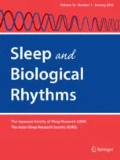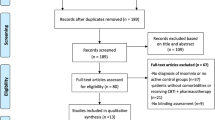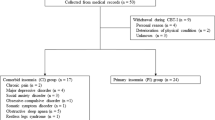Abstract
Although cognitive behavioral therapy (CBT-I) has been recommended for the treatment of insomnia comorbid with psychiatric disorders and medical diseases, the effectiveness of CBT-I in such cases remains to be established. To fill this gap in the literature, we conducted a meta-analysis on the efficacy of CBT-I in the remediation of insomnia severity, important disease-related symptoms, and quality of life (QoL) in comorbid insomnia. A comprehensive literature search identified 30 randomized controlled trials (RCT) that were eligible for inclusion in the final analyses. Effect sizes were computed with Hedges’g, and study quality was evaluated using the Jadad scale. Analysis revealed that the effect sizes of the treatment were medium to large for important disease-related symptoms (g = 0.60), insomnia severity (g = 0.94), subjective and objective sleep onset latency (g = 0.65 and g = 0.51, respectively), subjective waking after sleep onset (g = 0.61), subjective and objective sleep efficiency (g = 0.83 and g = 0.48, respectively), and sleep quality (g = 0.80), but was small for health-related QoL (g = 0.34) compared with a control group. At follow-up, the effect sizes of CBT-I were large for all outcome variables, but several large and significant heterogeneities were confirmed. CBT-I is an effective treatment for reducing the severity of insomnia and important disease-related symptoms of comorbid insomnia.




Similar content being viewed by others
References
References marked with an asterisk indicate studies included the present meta-analysis
Kim K, Uchiyama M, Okawa M, Liu X, Ogihara R. An epidemiological study of insomnia among the Japanese general population. Sleep. 2000;23:41–7.
Ford DE, Kamerow DB. Epidemiologic study of sleep disturbances and psychiatric disorders. An opportunity for prevention? JAMA. 1989;262:1479–84.
Ozminkowski RJ, Wang S, Walsh JK. The direct and indirect costs of untreated insomnia in adults in the United States. Sleep. 2007;30:263–73.
Weissman MM, Greenwald S, Nino-Murcia G, Dement WC. The morbidity of insomnia uncomplicated by psychiatric disorders. Gen Hosp Psychiatry. 1997;19:245–50.
Zammit GK, Weiner J, Damato N, Sillup GP, McMillan CA. Quality of life in people with insomnia. Sleep. 1999;22(Suppl 2):S379–85.
Neckelmann D, Mykletun A, Dahl AA. Chronic insomnia as a risk factor for developing anxiety and depression. Sleep. 2007;30:873–80.
Taylor DJ, Mallory LJ, Lichstein KL, Durrence HH, Riedel BW, Bush AJ. Comorbidity of chronic insomnia with medical problems. Sleep. 2007;30:213–8.
Ohayon MM. Prevalence of DSM-IV diagnostic criteria of insomnia: distinguishing insomnia related to mental disorders from sleep disorders. J Psychiatr Res. 1997;31:333–46.
American Academy of Sleep Medicine (AASM) (editor). International classification of sleep disorders—third edition (ICSD-3). Darien: AASM (2014).
Morin CM, Hauri PJ, Espie CA, Spielman AJ, Buysse DJ, Bootzin RR. Nonpharmacologic treatment of chronic insomnia. An American Academy of Sleep Medicine review. Sleep. 1999;22:1134–56.
Morin CM, Culbert JP, Schwartz SM. Nonpharmacological interventions for insomnia: a meta-analysis of treatment efficacy. Am J Psychiatry. 1994;151:1172–80.
Murtagh DR, Greenwood KM. Identifying effective psychological treatments for insomnia: a meta-analysis. J Consult Clin Psychol. 1995;63:79–89.
Okajima I, Komada Y, Inoue Y. A meta-analysis on the treatment effectiveness of cognitive behavioral therapy for primary insomnia. Sleep Biol Rhythms. 2011;9:24–34.
*Watanabe N, Furukawa TA, Shimodera S, et al. Brief behavioral therapy for refractory insomnia in residual depression: an assessor-blind, randomized controlled trial. J Clin Psychiatry. 2011;72:1651–8. (References marked with an asterisk indicate studies includedthe present meta-analysis).
*Edinger JD, Olsen MK, Stechuchak KM, et al. Cognitive behavioral therapy for patients with primary insomnia or insomnia associated predominantly with mixed psychiatric disorders: a randomized clinical trial. Sleep. 2009;32:499–510. (References marked with an asterisk indicate studies includedthe present meta-analysis).
*Ulmer CS, Edinger JD, Calhoun PS. A multi-component cognitive-behavioral intervention for sleep disturbance in veterans with PTSD: a pilot study. J Clin Sleep Med JCSM. 2011;7:57. (References marked with an asterisk indicate studies includedthe present meta-analysis).
*Currie SR, Wilson KG, Pontefract AJ, deLaplante L. Cognitive-behavioral treatment of insomnia secondary to chronic pain. J Consult Clin Psychol 2000;68:407–16. (References marked with an asterisk indicate studies includedthe present meta-analysis).
*Epstein DR, Dirksen SR. Randomized trial of a cognitive-behavioral intervention for insomnia in breast cancer survivors. Oncol Nurs Forum. 2007;34:E51–9. (References marked with an asterisk indicate studies includedthe present meta-analysis).
*Miro E, Lupianez J, Martinez MP, et al. Cognitive-behavioral therapy for insomnia improves attentional function in fibromyalgia syndrome: a pilot, randomized controlled trial. J Health Psychol. 2011;16:770–82. (References marked with an asterisk indicate studies includedthe present meta-analysis).
*Jungquist CR, O’Brien C, Matteson-Rusby S, et al. The efficacy of cognitive-behavioral therapy for insomnia in patients with chronic pain. Sleep Med. 2010;11:302–9. (References marked with an asterisk indicate studies includedthe present meta-analysis).
*Talbot LS, Maguen S, Metzler TJ, et al. Cognitive behavioral therapy for insomnia in posttraumatic stress disorder: a randomized controlled trial. Sleep 2014;37:327–41 (References marked with an asterisk indicate studies includedthe present meta-analysis).
*Wagley JN, Rybarczyk B, Nay WT, Danish S, Lund HG. Effectiveness of abbreviated CBT for insomnia in psychiatric outpatients: sleep and depression outcomes. J Clin Psychol. 2013;69:1043–55. (References marked with an asterisk indicate studies includedthe present meta-analysis).
*Chen HY, Cheng IC, Pan YJ, et al. Cognitive-behavioral therapy for sleep disturbance decreases inflammatory cytokines and oxidative stress in hemodialysis patients. Kidney Int 2011;80:415–22 (References marked with an asterisk indicate studies included in the present meta-analysis).
Wu JQ, Appleman ER, Salazar RD, Ong JC. Cognitive behavioral therapy for insomnia comorbid with psychiatric and medical conditions: a meta-analysis. JAMA Intern Med. 2015;175:1461–72.
Jadad AR, Moore RA, Carroll D, et al. Assessing the quality of reports of randomized clinical trials: is blinding necessary? Control Clin Trials. 1996;17:1–12.
Olkin I. Statistical methods for meta-analysis. San Diego: Academic; 1985.
Borenstein M, Hedges LV, Higgins JP, Rothstein HR. Introduction to meta-analysis. Chichester: Wiley; 2009.
Cohen J. Statistical power analysis for the behavioral sciences. 2nd ed. Hillsdale: L. Erlbaum Associates; 1988.
Higgins JP, Thompson SG. Quantifying heterogeneity in a meta-analysis. Stat Med. 2002;21:1539–58.
Egger M, Davey Smith G, Schneider M, Minder C. Bias in meta-analysis detected by a simple, graphical test. BMJ. 1997;315:629 – 34.
*Currie SR, Clark S, Hodgins DC, El-Guebaly N. Randomized controlled trial of brief cognitive-behavioural interventions for insomnia in recovering alcoholics. Addiction. 2004;99:1121–32. (References marked with an asterisk indicate studies includedthe present meta-analysis).
*Manber R, Edinger JD, Gress JL, San Pedro-Salcedo MG, Kuo TF, Kalista T. Cognitive behavioral therapy for insomnia enhances depression outcome in patients with comorbid major depressive disorder and insomnia. Sleep 2008;31:489–95. (References marked with an asterisk indicate studies included in the present meta-analysis).
*Arnedt JT, Conroy DA, Armitage R, Brower KJ. Cognitive-behavioral therapy for insomnia in alcohol dependent patients: a randomized controlled pilot trial. Behav Res Ther 2011;49:227–33 (References marked with an asterisk indicate studies included in the present meta-analysis).
*Margolies SO, Rybarczyk B, Vrana SR, Leszczyszyn DJ, Lynch J. Efficacy of a cognitive-behavioral treatment for insomnia and nightmares in Afghanistan and Iraq veterans with PTSD. J Clin Psychol. 2013;69:1026–42. (References marked with an asterisk indicate studies includedthe present meta-analysis).
*Harvey AG, Soehner AM, Kaplan KA, Hein K, Lee J, Li D, Rabe-Hesketh S, Ketter TA, Neylan TC, Buysse DJ. Treating insomnia improves mood state, sleep, and functioning in bipolar disorder: a pilot randomized controlled trial. J Consult Clin Psychol 2015;83:564–77. (References marked with an asterisk indicate studies included in the present meta-analysis).
*Edinger JD, Wohlgemuth WK, Krystal AD, Rice JR. Behavioral insomnia therapy for fibromyalgia patients: a randomized clinical trial. Arch Intern Med. 2005;165:2527–35. (References marked with an asterisk indicate studies includedthe present meta-analysis).
*Rybarczyk B, Stepanski E, Fogg L, Lopez M, Barry P, Davis A. A placebo-controlled test of cognitive-behavioral therapy for comorbid insomnia in older adults. J Consult Clin Psychol. 2005;73:1164–74. (References marked with an asterisk indicate studies includedthe present meta-analysis).
*Dirksen SR, Epstein DR. Efficacy of an insomnia intervention on fatigue, mood and quality of life in breast cancer survivors. J Adv Nurs 2008;61:664–75. (References marked with an asterisk indicate studies included in the present meta-analysis).
*Jungquist CR, Tra Y, Smith MT, et al. The durability of cognitive behavioral therapy for insomnia in patients with chronic pain. Sleep Disord. 2012;2012:679648. (References marked with an asterisk indicate studies includedthe present meta-analysis).
*Kapella MC, Herdegen JJ, Perlis ML, et al. Cognitive behavioral therapy for insomnia comorbid with COPD is feasible with preliminary evidence of positive sleep and fatigue effects. Int J Chron Obstruct Pulmon Dis 2011;6:625–35. (References marked with an asterisk indicate studies included in the present meta-analysis).
*Jansson-Frojmark M, Linton SJ, Flink IK, Granberg S, Danermark B, Norell-Clarke A. Cognitive-behavioral therapy for insomnia co-morbid with hearing impairment: a randomized controlled trial. J Clin Psychol Med Settings 2012;19:224–34. (References marked with an asterisk indicate studies included in the present meta-analysis).
*Tang NK, Goodchild CE, Salkovskis PM. Hybrid cognitive-behaviour therapy for individuals with insomnia and chronic pain: a pilot randomised controlled trial. Behav Res Ther 2012;50:814–21. (References marked with an asterisk indicate studies included in the present meta-analysis).
*Pigeon WR, Moynihan J, Matteson-Rusby S, et al. Comparative effectiveness of CBT interventions for co-morbid chronic pain & insomnia: a pilot study. Behav Res Ther. 2012;50:685–9. (References marked with an asterisk indicate studies includedthe present meta-analysis).
*Ritterband LM, Bailey ET, Thorndike FP, Lord HR, Farrell-Carnahan L, Baum LD. Initial evaluation of an Internet intervention to improve the sleep of cancer survivors with insomnia. Psychooncology. 2012;21:695–705. (References marked with an asterisk indicate studies includedthe present meta-analysis).
*Vitiello MV, McCurry SM, Shortreed SM, Balderson BH, Baker LD, Keefe FJ, Rybarczyk BD, Von Korff M. Cognitive-behavioral treatment for comorbid insomnia and osteoarthritis pain in primary care: the lifestyles randomized controlled trial. J Am Geriatr Soc. 2013;61:947–56. (References marked with an asterisk indicate studies included in the present meta-analysis).
*Romenets SR, Creti L, Fichten C, Bailes S, Libman E, Pelletier A, Postuma RB. Doxepin and cognitive behavioural therapy for insomnia in patients with Parkinson’s disease—a randomized study. Parkinsonism Relat Disord. 2013;19:670–5. (References marked with an asterisk indicate studies includedthe present meta-analysis).
*Matthews EE, Berger AM, Schmiege SJ, Cook PF, McCarthy MS, Moore CM, Aloia MS. Cognitive behavioral therapy for insomnia outcomes in women after primary breast cancer treatment: a randomized, controlled trial. Oncol Nurs Forum. 2014; 41:241–53. (References marked with an asterisk indicate studies included in the present meta-analysis).
*Hou Y, Hu P, Liang Y, Mo Z. Effects of cognitive behavioral therapy on insomnia of maintenance hemodialysis patients. Cell Biochem Biophys. 2014;69:531–7. (References marked with an asterisk indicate studies includedthe present meta-analysis).
*Martínez MP, Miro E, Sanchez AI, et al. Cognitive-behavioral therapy for insomnia and sleep hygiene in fibromyalgia: a randomized controlled trial. J Behav Med 2014;37:683–97 (References marked with an asterisk indicate studies included in the present meta-analysis).
*Smith CR, Lenhart RL, Kaiser J, Vignos MF, Thelen DG. Cognitive-behavioral therapy for insomnia in knee osteoarthritis: a randomized, double-blind, active placebo-controlled clinical trial. Arthritis Rheum. 2015;67:1221–33. (References marked with an asterisk indicate studies includedthe present meta-analysis).
*Lichstein KL, Wilson NM, Johnson CT. Psychological treatment of secondary insomnia. Psychol Aging 2000;15:232–40. (References marked with an asterisk indicate studies included in the present meta-analysis).
Edinger JD, Bonnet MH, Bootzin RR, et al. Derivation of research diagnostic criteria for insomnia: report of an American Academy of Sleep Medicine Work Group. Sleep. 2004;27:1567–96.
Buysse DJ, Ancoli-Israel S, Edinger JD, Lichstein KL, Morin CM. Recommendations for a standard research assessment of insomnia. Sleep. 2006;29:1155–73.
Irwin MR, Cole JC, Nicassio PM. Comparative meta-analysis of behavioral interventions for insomnia and their efficacy in middle-aged adults and in older adults 55+ years of age. Health Psychol. 2006;25:3–14.
Okajima I, Nakajima S, Ochi M, Inoue Y. Association among changes in sleep-related beliefs, sleep reactivity, and improvement of insomnia following cognitive behavioral therapy. Sleep Med. 2017;29:96–7.
Lancee J, Eisma MC, van Straten A, Kamphuis JH. Sleep-related safety behaviors and dysfunctional beliefs mediate the efficacy of online CBT for insomnia: a randomized controlled trial. Cogn Behav Ther. 2017;44:406–22.
Morin CM, Savard FBJ. Are changes in beliefs and attitudes about sleep related to sleep improvements in the treatment of insomnia? Behav Res Ther. 2002;40:741–52.
Leger D, Scheuermaier K, Raffray A, et al. HD-16: a new quality of life instrument specifically designed for insomnia. Sleep Med. 2005;6:191–8.
Espie CA, MacMahon KM, Kelly HL, et al. Randomized clinical effectiveness trial of nurse-administered small-group cognitive behavior therapy for persistent insomnia in general practice. Sleep. 2007;30:574 – 84.
National Institutes of Health. National Institutes of Health State of the Science Conference statement. Manifestations Management of Chronic Insomnia in Adults. Sleep. 2005;28:1049–57.
Holbrook AM, Crowther R, Lotter A, et al. Meta-analysis of benzodiazepine use in the treatment of insomnia. CMAJ. 2000;162:225–33.
Winkler A, Auer C, Doering BK, Rief W. Drug treatment of primary insomnia: a meta-analysis of polysomnographic randomized controlled trials. CNS Drugs. 2014;28:799–816.
Morin CM, Vallieres A, Guay B, et al. Cognitive behavioral therapy, singly and combined with medication, for persistent insomnia: a randomized controlled trial. JAMA. 2009;31:2005–15.
Feske U, Chambless DL. Cognitive behavioral versus exposure only treatment for social phobia: a meta-analysis. Behav Ther. 1995;26:695–720.
Author information
Authors and Affiliations
Corresponding author
Ethics declarations
Funding
This work was partially supported by a Grant-in-Aid for Scientific Research (C) (KAKENHI) awarded by the Japan Society for the Promotion of Science (JSPS, Grant Number 16K04388). The study was not registered as a clinical trial.
Ethical approval
This study was registered on the UMIN-CTR website (No. UMIN000015172) to meet this criterion of the International Committee of Medical Journal Editors (ICMJE).
Research involving human participants
This study is to review the published literatures involving human participants. The study was not registered as a clinical trial.
Conflict of interest
The authors have no disclosures or conflicts of interest to declare.
Electronic supplementary material
Below is the link to the electronic supplementary material.
Rights and permissions
About this article
Cite this article
Okajima, I., Inoue, Y. Efficacy of cognitive behavioral therapy for comorbid insomnia: a meta-analysis. Sleep Biol. Rhythms 16, 21–35 (2018). https://doi.org/10.1007/s41105-017-0124-8
Received:
Accepted:
Published:
Issue Date:
DOI: https://doi.org/10.1007/s41105-017-0124-8




